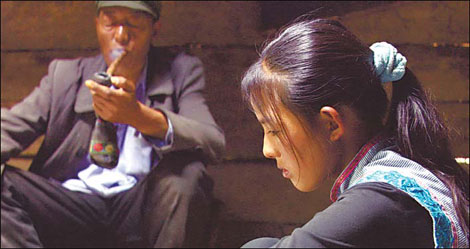A good movie with a bad tag may mislead
 |
|
The protagonists of Deep in the Clouds belong to the Lisu ethnic group and have no acting experience. [China Daily] |
It was purely by chance that I got to see Deep in the Clouds, one of the submissions to the 13th Shanghai International Film Festival. I was driven back from Shanghai airport because of a flight cancellation and, out of ennui, I wandered to the movie theater nearby.
The only reason I picked this one was it is a domestic production - I was not in a mood to watch subtitles that afternoon.
How wrong I was! It was subtitled, and even more surprising, it was good. "It could win something," I tweeted and recommended it.
But had I read up on the publicity, I might have eschewed it in the first place. It smells of a typical high-minded, self-conscious concept film. The story is set in a poverty-stricken mountain and the protagonists belong to the ethnic minorities. One can expect the scenery to be postcard pretty and the characters, noble savages.
In a sense, these are both true. There is a heavy dose of "ethnic" flavor. For one thing, all the dialogues are in Lisu and even the director could not understand a word. I remember a Tibetan version of Hamlet a few years ago. The version dubbed in Chinese was so awkward it sent shivers down my spine, but the Tibetan original is more tolerable.
Maybe distance enhances beauty. The Lisu story revolves around a village whose existence is threatened by - gasp - environmental protection. To protect the bears, the government confiscates hunting guns, and environmentalists successfully lobby against building a bridge, which might have brought in tourists and provided villagers with a source of revenue. A certain tree bark can be sold for medicinal use, but harvesting it is illegal.
Despite being faced with such a grim prospect, older villagers are still unwilling to relocate to nearby towns with government-subsidized housing - until bears again and again destroy crops and animals. Even humans mysteriously vanish, possibly victims of the bears.
This story could have easily been told from the government or environmentalist perspective. But in this movie, the government surprisingly plays a very minor role, leaving the stage to two local families. The filmmakers show integrity in portraying these people who would usually receive condescending humanitarianism in a literary or theatrical treatment. It is hard to leave one's land, even if it means helping the environment, endorsing a government policy, or defending oneself from the volatility of Mother Nature.
It is this unvarnished approach, rather than the polished artistry, that endeared me to this film. The director Liu Jie got an award for coaxing and crystallizing powerful performances out of people with no acting experience. In fact, as Liu disclosed, they had not even seen a television set. Only the male lead could speak some Mandarin.
Movies like this rarely sell, partly because people view it as propaganda, or as a morally uplifting and preachy tale often trumpeted in the media and quietly shunned by the public. In other words, they wear a gloss that is actually a curse.
Maybe it is time we separated the treatment from the subject matter. Any film has the potential to be good if it focuses on human conditions.
 0
0 







Go to Forum >>0 Comments